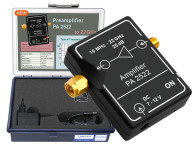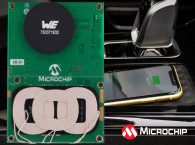
According to the German company, the ICS 105 IC scanner can be used together with the ICR near-field microprobes to measure high-frequency near fields above integrated circuits (ICS 105 GND set) and small modules (ICS 105 UH set). The analysis of an IC’s near fields provides a better understanding of what happens inside the IC at high frequencies. The measurements help analysing an IC’s emission problems and pinpoint its areas which are responsible for the emissions.
Apart from the ICR near-field microprobes from Langer EMV-Technik, hand-held probes or field sources can be fitted to the ICS 105 using the SH 01 probe holder (Figure 2).
Depending on the ICR near-field microprobe used, a magnetic or an electric field is measured in an area of 50x50x50 mm and shown on the PC with the CS scanner software. The ICR near-field microprobe can be rotated automatically by 360° with the rotary axis to precisely determine the direction of the magnetic field.

With its small dimensions of 350 x 400 x 420 mm
and its weight of 23 kg it fits easily on
a developer’s workplace.
The ICR near-field microprobes are ideal for measurements in the frequency range between 1.5 MHz and 6 GHz and achieve a measurement resolution of approximately 50 µm. The near-field microprobes for magnetic field measurements come in two different basic designs. ICR HV near-field microprobes have a vertical measurement coil and ICR HH near-field microprobes have a horizontal measurement coil. The probe head of the ICR E near-field microprobe contains a horizontal electrode to measure electric fields.
The portfolio of near-field microprobe types allows the user to make an optimum choice for a wide range of practical measurement purposes.
The near-field microprobes can be used to carry out the following measurements:
- Surface scans over ICs in accordance with IEC61967-3
- Volume scans over ICs
- PIN scans
During the measurement process, the microprobes move just a few µm above the respective object to be measured and enable an exact detection of the near fields. A pre-amplifier which is supplied with power via a bias tee is integrated in the near-field microprobe housing.
The ICS105 IC scanner is connected to a PC via a USB interface and controlled by the ChipScan scanner (CS scanner) software from Langer EMV-Technik (Figure 3). This means that not only can a near-field microprobe be moved but complex measuring sequences can also be programmed.

The CS scanner software developed by Langer lets the user read out the measured data from a spectrum analyzer, show this graphically (in 2D or 3D, Figure 4) as well as store and output the result on a CSV file. The software can also be used to control the most important spectrum analyzer settings (Figure 5).
Langer EMV-Technik GmbH is an electro-technical company which is active in the field of electromagnetic compatibility-related research, development and production. Langer’s pre-compliance measurement equipment and IC Test System, help developers to achieve new product qualities throughout the world. The company also offers development support advisory assistance in solving EMC tasks in module development. Langer EMV-Technik headquarters and manufacturing facilities are located in Bannewitz, near Dresden, Germany.
www.langer-emv.com







